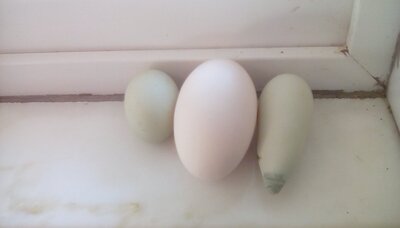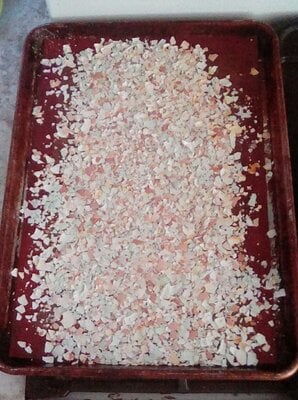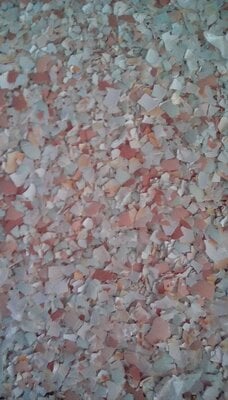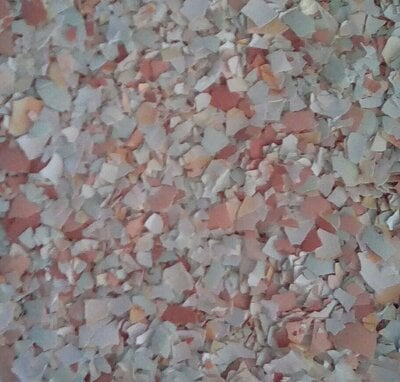There are many misconceptions out there about feeding chickens eggshells for calcium, so I'll share what I know and you can decide what you'll do.
Note: in this article, when I say "hen" I mean any laying female chicken. Technically, a female chicken is a "pullet" until they turn a year old.
First things first, why do hens need calcium?
A chicken eggshell is 95 percent "calcium carbonate". Calcium carbonate (CaCO3) is made of calcium (Ca), oxygen (O), and carbon (C). Don't worry, the rest of the article isn't this sciency!
Eggshells are the highest natural source of calcium in the world! But think of all the calcium it takes to make that tough shell! Not to mention that chickens need a bit of calcium for their bones too...
If hens don't get enough calcium, their eggshells will get thinner, and they may start having problems such as:

From left to right: fairy egg, extra long egg, abnormally shaped egg
This just goes to say, monitor your eggs for problems. Also, each chicken will react differently when lacking in calcium. I have one hen who will lay fairy eggs with extra thick shells when she is lacking in calcium, one who's eggshells get super thin, and a couple who lay extra long or pointy eggs.
How do I give them more calcium?
Thankfully, supplying calcium is pretty easy. There are three main ways to do this.
Layer Feed
You can find this at most feed stores. It works great, but if you have roosters or non-laying chicks in your flock, the extra calcium could hurt them. Use this only if you have a flock of laying hens.
Oyster Shells (OS)
You can find this at most feed stores too. Feed it as free-choice along side your ordinary feed and the hens will eat it according to their inner cravings.
I recommend always having a bag of it on hand, even if you use eggshells, for reasons I will state later.
Recycled Eggshells
This is the cheapest and most natural method. My personal favorite! Let's get started...
Methods:
Eggshells can be prepared in many different ways. Because this can sometimes be a hot topic, please listen to this: there is no right or wrong way. Just because somebody doesn't do it the same way you do doesn't mean you get to criticize them for it. We're all in the same world and want the best for our chickens!
One popular concern is that feeding the chickens eggshells will convince them to eat their own eggs. Some people have problems with this, and others don't. But if you are worried about it, the safest method is the baking method, and try crunching up your eggshells extra small.
Air-dry
In this method all you do is let your eggshells dry for a day or two before feeding them to your hens. Eggs prepared like this are often hard to crunch up. This is often combined with Rinsing.
Rinsing
Just rinse your shells in water. That's all there is too it.
Baking
This is the most cautious way, and the safest. Place your eggshells on a cookie sheet and bake them in the oven for five minutes. I recommend putting them in after something else has finished cooking so you don't waste any electricity. Some people do this in microwaves.

Eggshells fresh out of the oven
Those are the main ways. If you know of amy others, please comment below or send me a PM!
Extra notes:

Crunched up eggshells

Have fun with your eggshells!
Note: in this article, when I say "hen" I mean any laying female chicken. Technically, a female chicken is a "pullet" until they turn a year old.
First things first, why do hens need calcium?
A chicken eggshell is 95 percent "calcium carbonate". Calcium carbonate (CaCO3) is made of calcium (Ca), oxygen (O), and carbon (C). Don't worry, the rest of the article isn't this sciency!

Eggshells are the highest natural source of calcium in the world! But think of all the calcium it takes to make that tough shell! Not to mention that chickens need a bit of calcium for their bones too...
If hens don't get enough calcium, their eggshells will get thinner, and they may start having problems such as:
- Soft-shelled eggs
- Shell-less eggs
- Oddly shaped eggs
- Fairy eggs (aka pullet eggs, rooster eggs, yolk-less eggs, fart eggs, and more)

From left to right: fairy egg, extra long egg, abnormally shaped egg
This just goes to say, monitor your eggs for problems. Also, each chicken will react differently when lacking in calcium. I have one hen who will lay fairy eggs with extra thick shells when she is lacking in calcium, one who's eggshells get super thin, and a couple who lay extra long or pointy eggs.
How do I give them more calcium?
Thankfully, supplying calcium is pretty easy. There are three main ways to do this.
Layer Feed
You can find this at most feed stores. It works great, but if you have roosters or non-laying chicks in your flock, the extra calcium could hurt them. Use this only if you have a flock of laying hens.
Oyster Shells (OS)
You can find this at most feed stores too. Feed it as free-choice along side your ordinary feed and the hens will eat it according to their inner cravings.
I recommend always having a bag of it on hand, even if you use eggshells, for reasons I will state later.
Recycled Eggshells
This is the cheapest and most natural method. My personal favorite! Let's get started...
Methods:
Eggshells can be prepared in many different ways. Because this can sometimes be a hot topic, please listen to this: there is no right or wrong way. Just because somebody doesn't do it the same way you do doesn't mean you get to criticize them for it. We're all in the same world and want the best for our chickens!
One popular concern is that feeding the chickens eggshells will convince them to eat their own eggs. Some people have problems with this, and others don't. But if you are worried about it, the safest method is the baking method, and try crunching up your eggshells extra small.
Air-dry
In this method all you do is let your eggshells dry for a day or two before feeding them to your hens. Eggs prepared like this are often hard to crunch up. This is often combined with Rinsing.
Rinsing
Just rinse your shells in water. That's all there is too it.
Baking
This is the most cautious way, and the safest. Place your eggshells on a cookie sheet and bake them in the oven for five minutes. I recommend putting them in after something else has finished cooking so you don't waste any electricity. Some people do this in microwaves.

Eggshells fresh out of the oven
Those are the main ways. If you know of amy others, please comment below or send me a PM!
Extra notes:
- Most (though not all) people crunch up their eggshells before feeding them to the flock. How small you want them is up to you. Some people do them in bite sized pieces, some crumble them to a powder. Others just feed them to their flock whole.

Crunched up eggshells
- I wouldn't feed your chickens eggshells from store eggs. These often have chemicals sprayed on them.
- Chickens can also get calcium from insects.
- Every once in a while, I feed my hens oyster shells. Think of it this way; a bit of calcium from the eggshells will be saved for the hens' bones, and some will get lost along the way. Over time your recycled eggshells won't have enough calcium in them to support your hens. So I occasionally boost my eggshells with OS.
- Because of the latter note, you may be thinking "If I am going to use OS anyways, then why bother with eggshells?" Well, eggshells are completely free while you have to buy oyster shells. Would you rather feed your hens oyster shells full-time and pay the cost, or feed eggshells with just a bit of OS in the side?
- As mentioned before, I recommend feeding eggshells (or OS) as free-choice. The hens will eat it If there bodies are craving it, and the roosters will mostly avoid them. (https://www.backyardchickens.com/threads/cravings-they-are-real.1419990/)
- Recommended future reading: Eggshells for Laying Hens

Have fun with your eggshells!


 Most of the shells are from fresh egg seller in town , maybe a handful from store bought eggs ...... washed,aged & baked should be ok ?
Most of the shells are from fresh egg seller in town , maybe a handful from store bought eggs ...... washed,aged & baked should be ok ? I would be interested to hear if this happens again!
I would be interested to hear if this happens again!
Your method sounds great! Give it a shot!